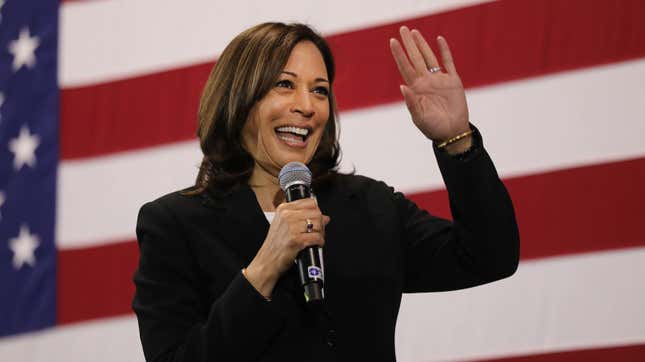Kamala Harris Wants to Fine Companies That Don't Pay Women the Same Wage as Men
Politics

In a world where women are told to keep their heads down, “lean in,” and not complain—even if they earn less than their male counterparts—Kamala Harris has a better idea: make companies responsible for paying employees equally.
On average, white women earn 80 cents for every dollar a white man makes—and the number is far lower for black women and Latinas. (And according to one study, when accounting for the fact that women are more likely to have to take a break in their careers than men, women earn only 49 cents to a man’s dollar.) Yet there’s a cultural stigma against talking about money and negotiating for money (especially among women), and under current law, the onus is upon employees to tell their bosses when they suspect they are being paid unfair wages—which can lead to retaliation and further discrimination.
In a new policy proposal, Harris says that as president, she’d require companies to submit their pay information to the government and pay fines if they fail to close their pay gaps. “What I am proposing is we shift the burden: It should not be on that working woman to prove it, it should instead be on that large corporation to prove they’re paying people for equal work equally,” Harris told CNN. “It’s that simple, it’s literally that simple. And this, then, is not only about fairness and equality, it’s about transparency. Show us what you got. That’s it.”
Under the plan, companies will be required to receive “Equal Pay Certification” to “demonstrate they have eliminated pay disparities between women and men who are doing work of equal value.” The certification comes with several restrictions to squash pay discrimination, including barring from asking about prior salary history during the hiring process or from allowing employees to talk about their pay. If they fail to comply, companies will face a one percent fine on profits for every percentage of the pay gap.
The policy also addresses the reality that white people are far more likely to receive callbacks and promotions for jobs than people of color. The policy reads:
Too often, women are passed over for promotions, not hired for senior roles, or are prevented from advancing due to time they take off to care for a new child or ailing parent. These are forms of systemic pay discrimination too, and we need to shine a light on them. That’s why under our plan, companies will be required to report statistics on the percentage of women in leadership positions and the percentage of women who are amongst the company’s top earners. They will also be required to report the overall pay and total compensation gap that exists between men and women, regardless of job titles, experience, and performance. These statistics will be reported by employees’ race and ethnicity.
Harris’s proposal is a step in the right direction, but in order to truly level the playing field for women—and women of color in particular—the government needs to enforce several initiatives that work together like raising the minimum wage and implementing a federal paid family leave (Harris supports both of these policies). Refreshingly, the initiative is one of many among Democratic candidates—namely Elizabeth Warren and Kirsten Gillibrand—who are placing the needs of women at the forefront of their campaigns.